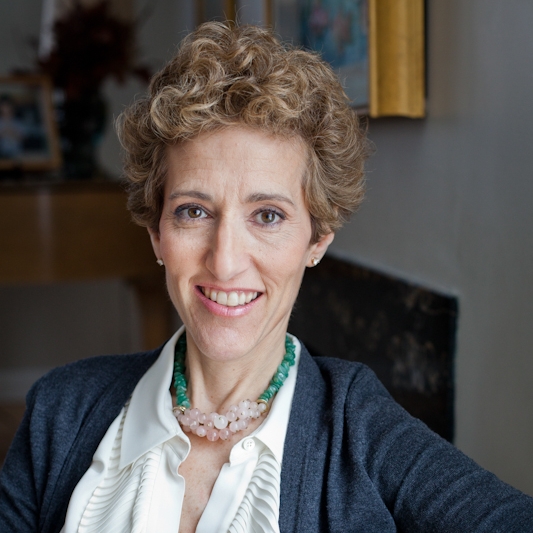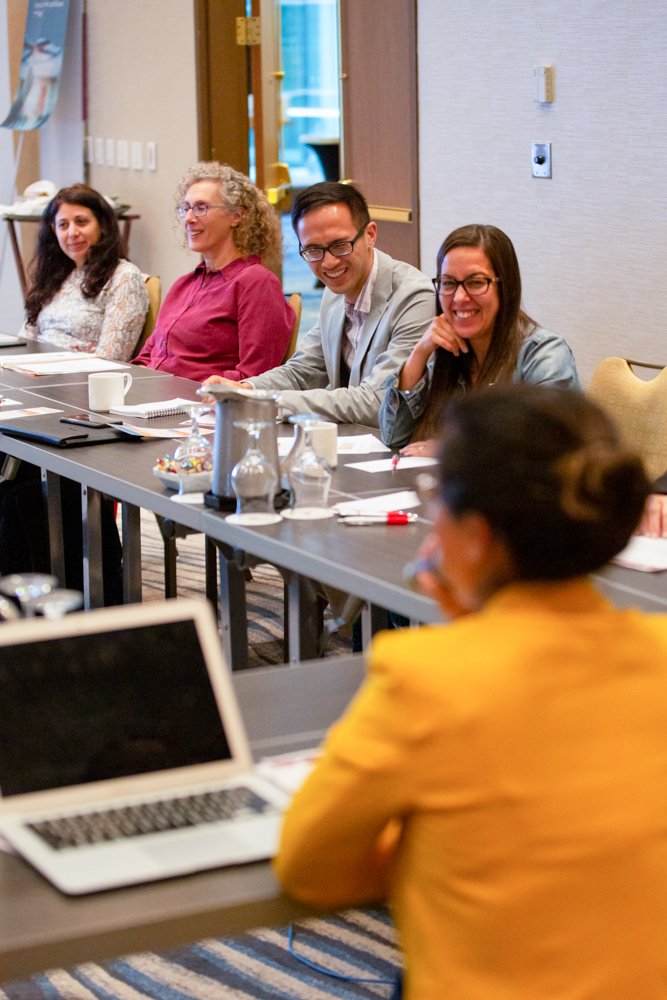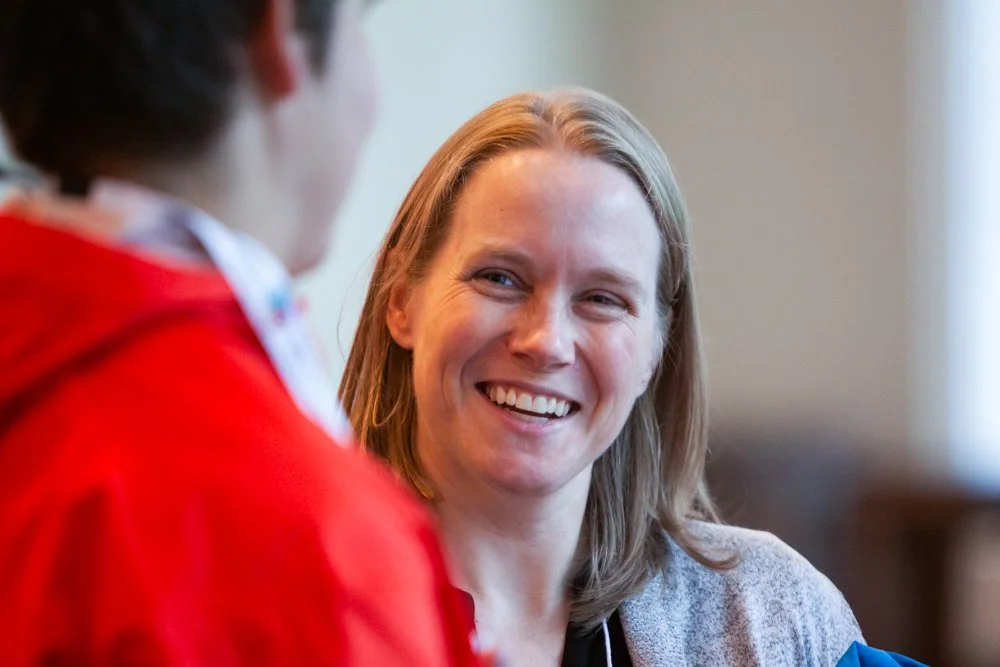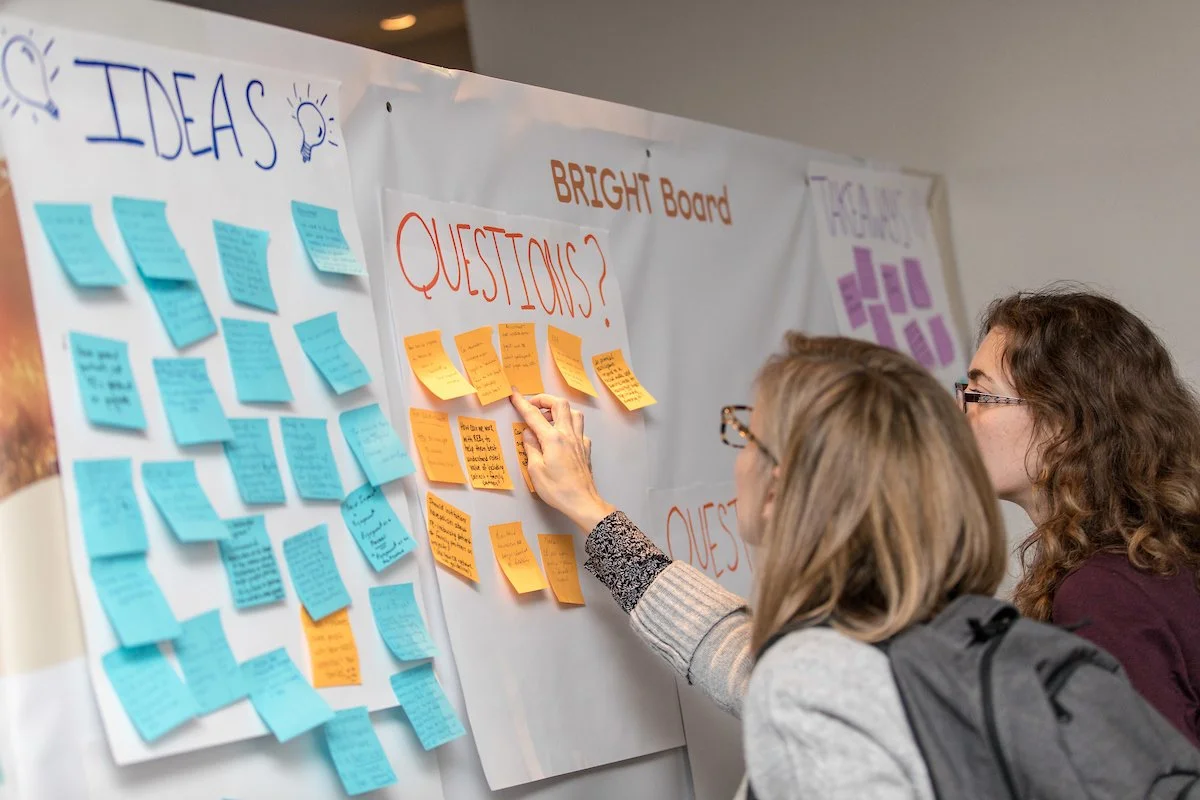As recently announced, the next phase of the CHILD-BRIGHT Network is being made possible thanks to a grant from the Canadian Institutes of Health Research (CIHR) under Canada’s Strategy for Patient-Oriented Research (SPOR), as well as matching funds from our generous partners. This support will allow us to grow from Network to Movement as we realize our mission for 2022-2026: moving our patient-oriented research into action through insight and methods grounded in implementation science and knowledge mobilization that embed the principles of equity, diversity, inclusion, decolonization and Indigenization.
In order to achieve this vision and become a movement for change for children and youth with brain-based developmental disabilities and their families, we have brought together experts from across Canada to lead our five patient-oriented programs.
Our Knowledge Mobilization (KM) Program team will move knowledge across practice and policy by building an infrastructure that will direct evidence to targeted users (patients and families, health care providers, health care decision-makers, and community) using tailored, evidence-informed, user-friendly strategies and by carefully evaluating the impact of knowledge mobilization strategies. To do so, Phase 1 Knowledge Translation Program Co-Leads Keiko Shikako and Connie Putterman will be joined by Stephanie Glegg.
Connie Putterman
CHILD-BRIGHT Knowledge Mobilization Program Co-Lead
Parent and Professional Advocate and Mentor, Instructor and Coordinator for family partnership, engagement and inclusion in autism, neurodevelopmental and mental health research,
Family Engagement in Research Coordinator, Centre for Addiction and Mental Health (CAMH)
Instructor, Co-Developer, Mentor, Consultant, Family Engagement in Research (FER) Course/Program, McMaster University/CanChild/Kids Brain Health Network
Keiko Shikako
CHILD-BRIGHT Principal Investigator & Knowledge Mobilization Program Co-Lead
Canada Research Chair in Childhood Disabilities: Participation and Knowledge Translation
Associate Professor, McGill University | School of Physical and Occupational Therapy
Stephanie Glegg
CHILD-BRIGHT Knowledge Mobilization Program Co-Lead
Investigator, BC Children's Hospital Research Institute
& Assistant Professor, Department of Occupational Science & Occupational Therapy
The University of British Columbia
We sat down with Connie, Keiko and Stephanie to learn more about the KM Program’s plans for Phase 2:
WHAT IS YOUR PROGRAM’S MANDATE?
Stephanie Glegg: First, I should clarify what we mean by knowledge mobilization. KM refers to both the activities involved in the co-creation of knowledge by researchers and knowledge users, and the use of research results and other knowledge to improve the health care system and its practices to enhance health outcomes. In CHILD-BRIGHT Phase 2, the KM Program and Implementation Science (IS) Research Program will be working together to mobilize knowledge across and beyond the network, with and for diverse knowledge users, including youth and families, health care providers, decision-makers, and community.
Keiko Shikako: Building on the successful Knowledge Translation Program efforts from Phase 1, we will develop the infrastructure to support nation-wide KM by identifying the best KM practices to use with various groups of knowledge users. We will also augment our current Policy Hub to include new national clinical, family and community Hubs to support collaborative planning and multi-directional knowledge exchange across groups. Finally, as we put evidence-informed KM strategies in place, we will evaluate them systematically, so that we can advance the science of patient-oriented KM.
Connie Putterman: Adding to this, we will engage knowledge users as active partners in KM throughout all phases of the work, including as planners, co-producers, messaging leaders, and end-user liaisons. To me, KM is all about communication strategies and competencies. It’s all about understanding the audiences you wish to inform and translating that knowledge in ways that are meaningful to them. We also want to ensure that the information is evidence informed, meaning that it comes from a place that has credibility through research and other ways of knowing.
HOW DO YOU PLAN TO ACCOMPLISH THIS? WHAT ARE THE MAIN TOOLS (CONCEPTS, FRAMEWORKS) THAT WILL BE USED TO FURTHER THIS MANDATE?
SG: KM, implementation science theory and evidence guide all our activities. We will also draw on network theory, because KM is inherently a social process that is enabled by our connections with one another. The KM Program will work with four key knowledge user groups by establishing Network Hubs: the Patient Hub, Clinician Hub, Policy Hub, and Community Hub. The purpose of these Hubs is to strengthen the relationships and facilitate communication within these specific groups to define priorities and then create opportunities for fluid, constant, and efficient knowledge exchange between the network and these groups. We’ll also consult with project teams in the use of best practices and evaluate our activities to identify what is working well, and where to shift our efforts.
HOW WILL YOUR PROGRAM MEANINGFULLY ENGAGE PATIENT-PARTNERS?
KS: The Phase 2 KM advisory committee will include partners with KM expertise from each of four key knowledge user groups in particular: patient-partners (family members and youth), health care and other service providers, decision-makers, and community organizations. The Hub structures we’ll be developing are a joint effort between the KM Program and the Citizen Engagement Program. We’ll also be collaborating with the Equity, Diversity, Inclusion, Decolonization and Indigenization (EDI-DI) Program to ensure that we are using best practices to engage equity-deserving groups, and that our activities resonate with and are informed by these groups. The Hubs are in essence all composed, co-led, co-designed in a participatory approach, bringing the concept of “patient-partners” to community partners and really sharing a vision that we are all equal members around the table—researchers, community members, patients, families, decision-makers, and youth—in the process of co-constructing knowledge and making sure academic research informs and is part of “the real world”.
CP: For me it comes from the top down and also the bottom up. For instance, built into the infrastructure of our program is a KM Parent Co-lead (me!). In all aspects of the decision-making at the governance level, I along with other parent-partner colleagues in similar roles will be contributing to those decisions. Our aim for the KM Program is to include other patient/family partners in all aspects of both the new infrastructure as described above, such as the design and the decision-making, and its implementation. When I say bottom up, I mean nurturing and capitalizing on the interest of the community, which will bring value, perspective and clarity in the act of partnering.
STEPHANIE, TELL US MORE ABOUT YOU. WHAT MOTIVATED YOU TO TAKE ON THIS LEADERSHIP ROLE WITH CHILD-BRIGHT?
SG: I’ve been a member of the CHILD-BRIGHT KT Committee since its inception and have had the pleasure of working with Connie and Keiko in that capacity. I’m an implementation scientist, with 15 years of experience facilitating KM in health care, so this work aligns with my passions. I’ve been involved in implementation and KM planning consultation, and in knowledge product/platform development and capacity-building initiatives through this work, which makes this role a great fit. My doctoral research examined the KM supports in place within pediatric health centres and research institutes across Canada, and patterns of social connections within these organizations that facilitate KM. This leadership role offers a space to apply the learnings from this work, to help the network expand its reach and impact using a holistic lens to mobilize meaningful change.
CONNIE, KEIKO, WHAT LEARNINGS FROM PHASE 1 WILL YOU BE LEVERAGING IN PHASE 2?
KS: Our co-leadership model with a parent-partner is one essential aspect that we will continue from Phase 1. We have worked in Phase 1 to develop mutual respect and relationships that are truly the base for participatory action research. The appreciation of perspectives, and trust among the team were invaluable to our co-lead and committee decision-making model. Parent-partners and youth were not only part of our KT committee in Phase 1, but were also part of setting priority research questions, collecting and analyzing data, and shared decisions about ways to use and disseminate information. We plan to continue this approach into Phase 2 and expand on the KM strategies and program evaluation.
CP: We also learned that with KT and KM, there is a lot of internal advocacy and learning that needs to be done. This means that among the CHILD-BRIGHT community we need to continue to work for clarity and understanding of what we can and can’t do in a research context.
WHY IS IT IMPORTANT TO FOCUS ON MOBILIZING KNOWLEDGE ABOUT PATIENT-ORIENTED RESEARCH NOW?
KS: Knowledge Translation Science as a field of inquiry has been out there for decades now. It has always been important to mobilize knowledge about patient-oriented research, but now we have developed tools, methods, and learned more about the critical aspects of it: true engagement from patients/citizens, the importance of evaluation, and the absolute necessity of listening to the priorities and directions of those who should use the information to guide research priorities. Involving patient and parent-partners as research team members increases the relevance of the research and helps to engage more knowledge users in research. KM is critical in ensuring that the findings of research, and the experiential knowledge of children, families, and health care providers, reaches the people who will benefit from or be impacted by it. If we want to effect real change in the health care system, KM needs to be informed by all the groups involved: from the “end-users” (patients, families) to the ones delivering health care (health care providers and community organizations) up to the ones making decisions about health care systems, budgets, and priorities (decision-makers).
CP: In addition, the movement of patient-oriented research and engagement in research is still on a forward trajectory. We want to capture the momentum now while we are on an “upswing” and in a new frontier in the health research community. We have also learned from the growing body of evidence that patient/family/youth voices improve processes and lead to better health care outcomes for all.
WHAT ARE YOU MOST EXCITED TO SEE IN PHASE 2?
SG: We’re excited to be collaborating across programs so that the principles of EDI-DI, citizen engagement, training and capacity building, and implementation science can be integrated into everything we do, and hopefully vice versa. There is so much to learn about mobilizing knowledge while being attentive to and including different ways of knowing, including with groups that have been historically and systematically marginalized. It is important that we are finally paying attention not only to who has a seat at the table, but especially who does not have a seat, and we are not inviting them to “our table” but trying to find a way to their table to learn from them. This is the “movement” that is one of the most challenging ones in the “network to movement”, but one step that is absolutely necessary to be able to say we are really mobilizing knowledge across academia, communities, and systems.
CP: I am most excited to get out there and spread the word. It is still a bit of an unknown entity that someone from a non-academic setting can contribute and benefit from research in this way. No longer is research meant for the ivy tower. It’s meant for all of us!
Thank you, Connie, Stephanie and Keiko, for this insight into the KM Program!
If you have questions about our KM Program, reach out to our Program Coordinator Alix Zerbo.












